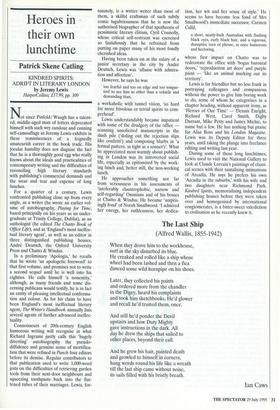Heroes in their own lunchtime
Patrick Skene Catling
KINDRED SPIRITS: ADRIFT IN LITERARY LONDON by Jeremy Lewis HarperCollins, £17.99, pp. 309 Not since Pinfold / Waugh has a talent- ed, middle-aged man of letters deprecated himself with such wry candour and cunning self-camouflage as Jeremy Lewis exhibits in these reminiscences of a feignedly amateurish career in the book trade. His jocular humility does not disguise the fact that he is a thoroughly good egg who really knows about the ideals and practicalities of contemporary writing and the difficulties of reconciling high literary standards with publishing's commercial demands and the wear and tear and expense of long lunches.
For a quarter of a century, Lewis confronted publishing close up from every angle, as a writer (he wrote an earlier vol- ume of autobiography, Playing for Time, based principally on his years as an under- graduate at Trinity College, Dublin), as an anthologist (he edited The Chatto Book of Office Life), and as 'England's most ineffec- tual literary agent', as well as an editor in three distinguished publishing houses, Andre Deutsch, the Oxford University Press and Chatto & Windus.
In a preliminary 'Apologia,' he recalls that he wrote 'an apologetic foreword' to that first volume, and promises not to write a second sequel until he is well into his eighties. He calls himself 'a nonentity,' although, as many friends and some dis- cerning publicans would testify, he is in fact an entity of pleasing intellectual conforma- tion and colour. As for his claim to have been England's most ineffectual literary agent, The Writer's Handbook annually lists several agents of further advanced ineffec- tuality.
Connoisseurs of 20th-century English humorous writing will recognise in what Richard Ingrams justly calls this 'hugely diverting' autobiography the pseudo- diffidence and genuine sense of mortifica- tion that were refined in Punch four editors before its demise. Regular contributors to that publication used to write 1,000-word jests on the difficulties of retrieving garden tools from their next-door neighbours and squeezing toothpaste back into the flat- tened tubes of their marriages. Lewis, for- tunately, is a wittier writer than most of them, a skilful craftsman of such subtly comic lugubriousness that he is now the authorised biographer of that apotheosis of pessimistic literary elitism, Cyril Connolly, whose critical self-restraint was exercised so fastidiously that he refrained from putting on paper many of his most fondly cherished ideas.
Having been taken on at the salary of a junior secretary in the city by Andre Deutsch, Lewis was 'aflame with admira- tion and affection'.
However, he says he was
too fearful and too on edge and too tongue- tied to see him as other than a volatile and demanding titan,
a workaholic with tunnel vision, 'so hard for more frivolous or trivial spirits to com- prehend'.
Lewis understandably became impatient with some of the drudgery of the office scanning unsolicited manuscripts in the slush pile ('doling out the rejection slips like confetti') and composing blurbs in 'a formal pattern, as tight as a sonnet's'. What he appreciated most warmly about publish- ing in London was its introverted social life, especially as epitomised by the work- ing lunch and, better still, the non-working lunch.
He approaches something not far from seriousness in his assessments of 'intolerably claustrophobic, narrow and self-regarding' Oxonians and of his bosses at Chatto & Windus. He became 'surpris- ingly fond' of Norah Smallwood. 'I admired her energy, her ruthlessness, her dedica- tion, her wit and her sense of style.' He seems to have become less fond of Mrs Smallwood's immediate successor, Carmen Callil,
a short, neatly-built Australian with flashing black eyes, curly black hair, and a vigorous, disruptive turn of phrase, at once humorous and hectoring,
whose first impact on Chatto was to redecorate the office with 'bogus baronial doors,' reproduction art deco' and purple paint — 'like an animal marking out its territory'.
Lewis is far friendlier but no less frank in portraying colleagues and companions without the power to give him boring work to do, some of whom he categorises in a chapter heading, without apparent irony, as 'Heroes of Our Time' — Dennis Enright, Richard West, Carol Smith, Digby Durrant, Mike Petty and James Michie, to name but a few. He has nothing but praise for Alan Ross and his London Magazine. Lewis was its Deputy Editor for three years, until taking the plunge into freelance editing and writing last year.
During some of those long lunchtimes, Lewis used to visit the National Gallery to look at Claude Lorrain's paintings of classi- cal scenes with their tantalising intimations of Arcadia. He says he prefers his own 'Arcadia in the suburbs,' with his wife and two daughters near Richmond Park. Kindred Spirits, memorialising independent publishing houses before they were taken over and homogenised by international conglomerates, is a bitter-sweet valediction to civilisation as he recently knew it.


















































 Previous page
Previous page